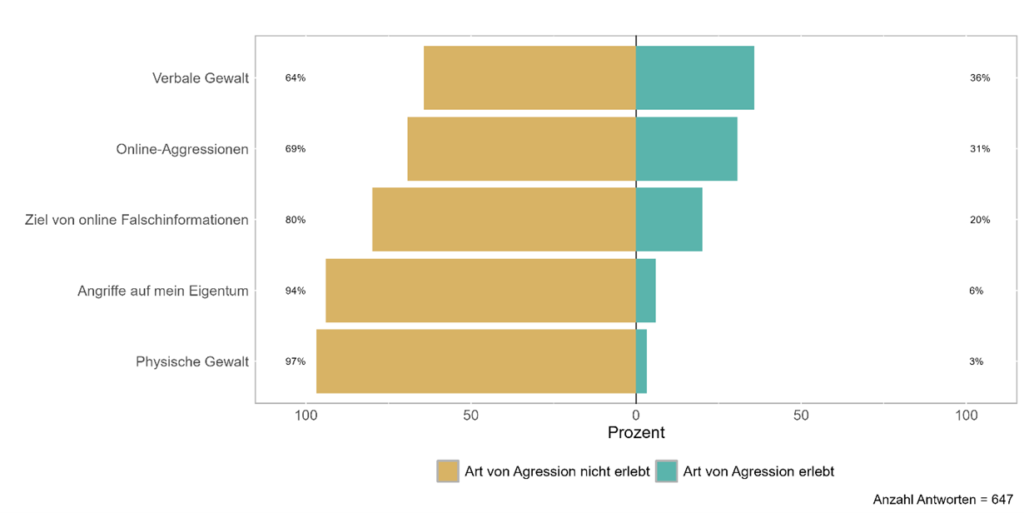
Threats, outbursts, assaults – violence against politicians in Swiss cities
Members of parliaments in Swiss cities repeatedly experience aggression. This affects their satisfaction with their office, as the new study report by the Center for Democracy Studies Aarau shows. And it makes it clear why some even drop out of politics.
Recently, the media have repeatedly reported on violence against politicians in Switzerland, including in connection with the assassination attempt on Donald Trump. On 14.07.2024, for example, watson.ch ran the headline “Politicians in Switzerland live so dangerously”, while the Tagesanzeiger ran the same headline around a year earlier on 15.08.2023 “`There is so much hatred` – 5 politicians tell how they are threatened”. Now, for the first time, the study report by the Center for Democracy Aarau systematically reveals the extent of aggression against politicians in municipal parliaments.
A new look at violence in community politics
Previous research on violence in the community has mainly focused on the executive. The study that has now been published (see box) takes a new look at the topic with its questions:
- How satisfied are parliamentarians in Swiss cities with their mandate?
- To what extent are they affected by aggression and violence?
- What are the most important reasons for local members of parliament to leave politics?
Stefan Kalberer, research associate at the Center for Democracy Studies Aarau, explains why this is important: «Parliaments are the central place of a democracy. Discussions take place, compromises are reached and decisions are made. Unfortunately, we still know very little about how local parliaments work in Switzerland. This is where our study report comes in and aims to shed light on the challenges faced by local parliamentarians.»
Verbal violence is booming
In principle, parliamentarians are satisfied with their mandate, especially if they perceive themselves as influential. On the other hand, however, experiences of aggression have a massive impact on satisfaction:
«Over a third of respondents say they have experienced verbal violence in the last twelve months. 6.4 percent state that their property has been attacked in the last twelve months and three percent have been physically assaulted.» (Study report, CDA, page 19.). Politicians also experience violence in the digital space, for example on social media or through online misinformation, as the following graphic shows.

Fig. 1: What kind of aggression have city parliamentarians experienced in the last twelve months?
There are also differences between the different parts of the country. Violence against people or their property is more widespread in German-speaking Switzerland than in other parts of the country. On the other hand, verbal violence is more common in percentage terms in Latin Switzerland. Women are also more affected by verbal violence and damage to property in percentage terms. Furthermore, members of parliament who are on the right side of the left-right spectrum are more affected by physical violence.
This has consequences for democracy, according to Daniel Kübler, member of the directorate at the Center for Democracy Studies Aarau: «Politicians at municipal level are also increasingly facing hostility. If municipalities are regarded as ‘schools of democracy’, this is bad news. Aggression and violence against public officials are unacceptable. The small-scale nature of a municipality would be ideally suited to breaking down prejudices against political opponents and living a peaceful culture of democratic debate.»
Why city parliamentarians are stepping down
These experiences of violence influence how members of parliament behave. They use social media differently and over 30 percent of those surveyed reported an influence on their own parliamentary work. Experiences of aggression and violence in office can even be a reason for local members of parliament to give up their mandate. Female members of parliament are more likely than their male colleagues to say that the violence they experienced had a decisive influence on their decision to resign. Other reasons for resigning from office include aspiring to a higher office, considering their duty fulfilled or the time commitment too high.
| Data and method The data in the ZDA study report “Survey of members of municipal parliaments in Switzerland” is based on a Europe-wide survey of members of municipal parliaments. For this report, 4599 members of parliament from all parts of the country were invited to take part in the survey. 1009 people took part in the survey. The survey ran from September 29 to December 5, 2023. |
The Study Report
Contact
Prof. Dr. Daniel Kübler, Member of the Board of Directors, Center of Democracy Studies Aarau
daniel.kuebler@zda.uzh.ch, 078 815 67 60
Stefan Kalberer, Research assistant, Center of Democracy Studies Aarau
stefan.kalberer@zda.uzh.ch, 079 863 80 73
About the CDA
The Centre for Democracy Studies Aarau is a scientific research centre supported by the University of Zurich, the University of Applied Sciences and Arts Northwestern Switzerland, the Canton of Aargau and the City of Aarau. It conducts basic research and addresses current issues relating to democracy – regionally, in Switzerland and worldwide. www.zdaarau.ch